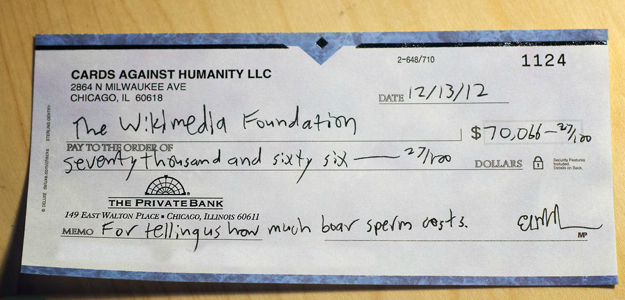 Cards Against Humanity, the adults-only party game that got its start thanks to a successful Kickstarter campaign at the beginning of 2011, has closed out 2012 with a $70,000 payment to the Wikimedia Foundation to ensure the continuation of Wikipedia as a free online resource.
Cards Against Humanity, the adults-only party game that got its start thanks to a successful Kickstarter campaign at the beginning of 2011, has closed out 2012 with a $70,000 payment to the Wikimedia Foundation to ensure the continuation of Wikipedia as a free online resource.
The game, described by its makers as “as despicable and awkward as you and your friends,” allows players to choose their preferred answer to a question chosen by “answer cards,” with the questions relatively benign and pop-culture savvy (“What’s my anti-drug?” or “What’s the most emo?” being two examples) and the answer options being … somewhat less polite (“Scrotal frostbite,” “Smegma” and “The profoundly handicapped” are some options from which to choose). Created by a group of friends at a New Year’s Eve party, the game’s Kickstarter campaign had raised $15,570 – almost four times the original target of $4000 – thus a legend, or at least a successful new party game, was born.
To celebrate this most wonderful time of the year, the game owners released a holiday expansion pack of questions and answers under a pay-what-you-want arrangement despite the potential risk from the cost involved ($225,762.63 in total, a cost which was broken down as $71,040.24 in manufacturing costs, $139,799.21 in shipping within the US and Canada alone, with the remainder split between other incidental costs). Thankfully, it was a risk that paid off; almost $300,000 was paid by those purchasing the packs, leaving the makers a profit of $70,066.27.
Within two days, the expansion packs had almost completely sold out, with people paying on average $3.89 per pack; the median price paid was $5, with 57.14 percent of those buying the packs paying that exact amount. About 20 percent paid absolutely nothing, and the highest price paid was just under $25. The expansion pack announcement raised web traffic for the site by more than 500 percent.
On the site, the Cards Against Humanity team suggested possible ways to spend $70,066.27 – including buying 5.8 million live crickets, or a condom for every man, woman and child in El Paso, TX – but ultimately, the money went to a more deserving home. “Instead of buying these things, we decided to donate the profits from our holiday packs to charity,” the team explained. “We’ve made a $70,066.27 contribution to the Wikimedia Foundation, which runs Wikipedia. Wikipedia is very important to us because without it we would not have known the exact volume of a dose of fresh boar sperm or graduated college.”
Max Temkin, one of the co-creators of the game, expanded on the reasoning to the Guardian newspaper. “From the outset we decided we wanted to give all the proceeds to charity and that made it more fun for us,” he said. “We wanted to pick something we thought the users of our game of had heard of and believed in and used and we felt like Wikipedia is pretty unique in terms of having universal appeal.” Consider it the ultimate in crowd-funded playing-it-forward.


